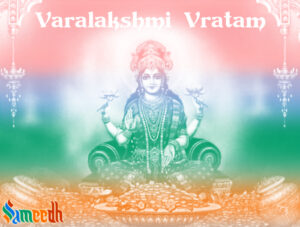Varalakshmi Vratham, also known as Varalakshmi Puja, is a Hindu festival celebrated to honor and invoke the blessings of Goddess Lakshmi, the goddess of wealth, prosperity, and well-being. It is typically observed by married women, who pray for the health, wealth, and prosperity of their families.

The festival is observed on the second Friday or the Friday before the full moon day (Purnima) in the Hindu lunar month of Shravan, which usually falls in July or August according to the Gregorian calendar. It is believed that worshipping Goddess Varalakshmi on this auspicious day can bestow blessings, fulfill wishes, and bring prosperity and happiness to the devotees’ lives.
Varalakshmi Vratham holds significant importance in Hindu culture, particularly among married women, as it is believed to invoke the blessings of Goddess Lakshmi, the deity of wealth, prosperity, and well-being. Here are some key aspects of the significance of Varalakshmi Vratham:
- Blessings of Goddess Lakshmi: The main significance of Varalakshmi Vratham lies in seeking the blessings of Goddess Lakshmi. Devotees believe that worshipping Goddess Varalakshmi with devotion and sincerity can bring wealth, prosperity, and auspiciousness into their lives. They pray for the well-being and prosperity of their families, seeking blessings for health, happiness, and success in all endeavors.
- Fulfillment of Wishes: It is believed that observing Varalakshmi Vratham with dedication and purity can lead to the fulfillment of one’s wishes and desires. Devotees pray to Goddess Lakshmi to grant them their heartfelt wishes and to remove obstacles and challenges from their paths.
- Enhancing Marital Bliss: Varalakshmi Vratham is particularly significant for married women, who observe the vratham (vow) to seek the well-being and longevity of their husbands. It is believed that by performing the puja (worship) rituals with devotion, married women can strengthen their marital bonds and ensure the happiness and harmony of their families.
- Spiritual Merit: Observing Varalakshmi Vratham is considered a meritorious act in Hindu tradition. It is believed that by performing the vratham and engaging in rituals such as puja, fasting, and offering prayers, devotees accumulate spiritual merit (punya) and purify their minds and souls.
- Family Tradition and Social Bonding: Varalakshmi Vratham is often observed as a family tradition passed down through generations. It fosters a sense of cultural identity and familial bonding as family members come together to perform the puja rituals, share meals, and exchange blessings. It also provides an opportunity for social gatherings and community participation, as devotees visit each other’s homes to offer prayers and seek blessings.
The name “Varalakshmi” translates to “the boon-granting goddess,” and “Vratham” refers to a religious vow or observance. During Varalakshmi Vratham, married women wake up early, clean their homes, and prepare for the puja (worship) of Goddess Lakshmi. They typically wear traditional attire, adorn themselves with jewelry, and create a sacred space for the puja.
The puja rituals involve the installation of a sacred kalash (pot) decorated with mango leaves, coconut, and other auspicious items. The main deity, Goddess Lakshmi, is invoked and worshipped with offerings of flowers, fruits, sweets, and other auspicious items. Devotees recite prayers, chant mantras, and perform aarti (rituals of waving lamps) to seek the blessings of Goddess Lakshmi.
After the puja, devotees distribute prasad (blessed food) to family members and friends. It is also customary for women to visit each other’s homes, exchange gifts, and offer prayers together during Varalakshmi Vratham.
Overall, Varalakshmi Vratham is a festival celebrated with devotion, joy, and familial bonding, symbolizing the importance of wealth, prosperity, and auspiciousness in Hindu culture.
